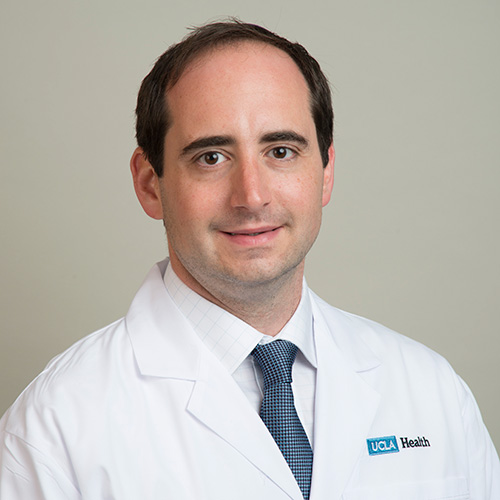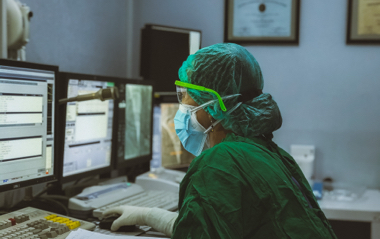Dr. Ira Hofer
Dr. Hofer is the inaugural Toffler Scholar for 2020 at UCLA.
Biography

Dr. Ira Hofer was born and raised in New York. As an undergraduate, he earned a Bachelor of Applied Science in Materials Science and a Bachelor of Science in Finance and General Management from the University of Pennsylvania and the Wharton School. During his studies, he learned how to work with databases, and he spent one summer helping small businesses set up databases and data analytics.
After college, Dr. Hofer started his career in real estate finance. Despite his success, he soon realized that finance wasn’t for him. He wanted to find something that he was passionate about. So, he went to medical school.
Dr. Hofer earned his MD and completed his residency in anesthesiology at the Icahn School of Medicine at Mount Sinai. His non-traditional background was an asset as he began to study big data analytics in the field of anesthesiology with Dr. David Reich. He began working with electronic medical record (EMR) data during his third year of medical school and has been involved in the field ever since.
After medical school, Dr. Hofer moved to Southern California and took a position at UCLA. He jokes that his wife and kids decided to move to LA, and he wanted to go with them.
He is currently an Assistant Professor of Anesthesiology at UCLA as well as the Director of the department’s Division of Bioinformatics. He is an anesthesiologist and clinical informaticist. His focus is on using the data collected during patient care to better understand, quantify, and ultimately mitigate perioperative risk. At UCLA, Dr. Hofer established a bioinformatics infrastructure in the Department of Anesthesiology and Perioperative Medicine and designed and implemented the Perioperative Data Warehouse, a comprehensive infrastructure that extracts key clinical information from the EMR and organizes it to facilitate analytics. Dr. Hofer has published multiple manuscripts on techniques for leveraging multiple data points in the EMR in order to better characterize patients – a technique he has termed triangulation. He has also created systems that integrate these phenotypes into clinical practice, allowing clinicians to focus limited resources on the highest risk patients.
Dr. Hofer enjoys spending time with his wife Ronit and their three kids. He also enjoys bicycling in the beautiful Southern California weather and doing woodworking.
“As an early-stage investigator, it’s really challenging to get things started, build your own lab, and have that level of support because you’re competing with people who have more experience and more of a track record. The support from the Karen Toffler Charitable Trust — both financial and in terms of the exposure — makes a big difference.”
- Dr. Hofer
Research Focus
Problem
According to recent analysis, surgery is the third leading cause of death, behind only ischaemic heart disease and stroke. While very few people die in the operating room, data suggests that at least 4.2 million people worldwide die within 30 days of surgery each year. Today, surgeons have very little data when trying to determine a patient’s overall risk of complications after a specific surgery.

Research Focus
Dr. Hofer’s research is dedicated to understanding, quantifying, and ultimately mitigating risk before surgery (the perioperative period). Once the field is able to quantify risk, the next step is to get that information to surgeons so they can be more informed about potential complications.
For many patients, the risk in any one specific area of their health is low. For example, they may have a slightly elevated risk of post-surgery complications due to a heart condition, and a slightly elevated risk due to obesity. Taken individually, these risk factors would likely not be cause for much concern.
However, these different areas layered together pose a greater risk. They might even cause a surgeon to recommend a different course of treatment, if the surgeon knew about all of them and their compounding effects.
Currently, patient data is spread across multiple records across multiple physicians of different specialties. Dr. Hofer is working on new ways to gather and process all of the patient’s data across different specialties and records. He is also working on translating those learnings across patients and delivering that information to surgeons effectively.

Benefits
Machine learning and AI can help identify layered risks and risks across different specialities. The goal is to help doctors better understand the risks that a particular patient faces so the doctors can choose the best, most effective treatment option and ultimately decrease the prevalence of postoperative complications and death.
Karen Toffler Charitable Trust Investment
The UCLA Department of Computational Medicine is driving international efforts to apply data science to biomedical informatics with the goal of transforming patient care. Among its highest priorities, the UCLA Artificial Intelligence in Medicine Program (AI in Medicine) brings together computer scientists and clinicians to improve the speed and accuracy of diagnosis, predict treatment outcomes and side effects, and reduce medical care costs in our healthcare system.
The Investment from the Karen Toffler Charitable Trust enabled the department to strategically pair Ira Hofer, MD, an early career clinician in the Department of Anesthesiology and Perioperative Medicine with Eran Halperin, PhD, a data scientist from the Department of Computational Medicine. Together, they are working to employ data science strategies directly to Dr. Hofer’s clinical practice.
“I went into medicine because I wanted to help people. I wanted to do something meaningful. The reality of healthcare is that as a physician, you can take care of one patient at a time. It is meaningful, but there’s no way to scale. In leveraging big data, you have the ability to change care for hundreds of thousands of patients, and improve outcomes on a massive scale.”
- Dr. Hofer